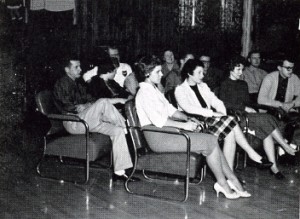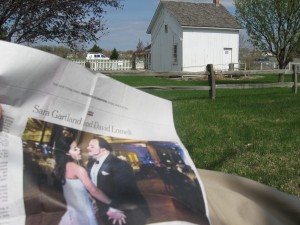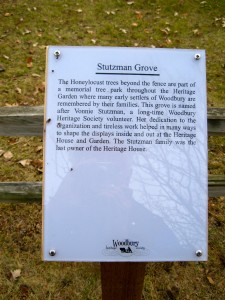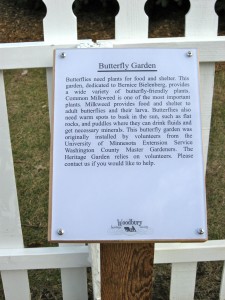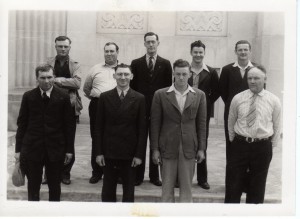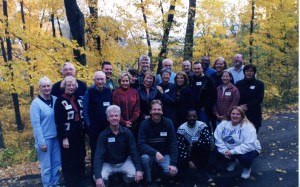POSTNOTE Mar. 21, 2016: see posts on same topic here (12/20/2011), here (5/12/09) , here (5/23/13) and here (3/20/16, especially #6).
Earlier today [Dec. 13, 2011] I was at the annual meeting of an organization I’ve long been part of called the Minnesota Alliance of Peacemakers. One of the group rose to ask the speaker a question about the new proposal relating to drones in Thief River Falls MN. More information is here.
Back home, on the evening news, was the continuing story of the drone that went down in Iran, and whose wreckage is now in Iran’s custody. Much ado is made of this event.
Google “drone” and there are over 9,000,000 results. No doubt, it is a new and permanent and controversial feature of warfare.
Given the far more deadly alternatives – nuclear, invasions with wholesale and wanton killing, and similar – I’m not inclined to get very upset about the role of drones in the modern world. Without any doubt, they, like any other device, are subject to abuse, but over all, they could reduce substantially the indiscriminate killing of innocents that has always been the standard of warfare up through the Iraq and Afghanistan Wars, wars especially deadly to civilians. Here’s a conservative estimate of Iraqi deaths (not even factoring in all their other huge losses in that ugly war) which has been catastrophic to the U.S as well.
Given the choice between use of drones and precise targeting or nuclear, or other ‘scorched earth’ invasions, there’s no question in my mind: drones are preferable.
Given my personal druthers, there would be no war. Period. But given the nature and history of humans, particularly those humans who seem to rise to the top of power pyramids, it seems unlikely that we will ever reach the nirvana of real and lasting peace.
The best we can do – and it is the best – is to continue working towards a more peaceful world, through peaceful means.
I’m accustomed to saying that I’m a military veteran myself, from a family full of military veterans. As I pointed out to a relative, recently, I’m a member of both the American Legion and Veterans for Peace, and I don’t see any contradiction, though my cause is that of the Veterans for Peace.
However limited, there is room for conversation among people willing to listen to each other, and considering other points of view. But one can’t have such a conversation in separate rooms.
As I listened, today, my thoughts went back to a little article I’d seen before in the college newspaper I was privileged to edit. The article was one of those that could be used for filler, and appeared in the opinion page, May 24, 1961. This was four months after Dwight Eisenhower’s famous farewell address including his concerns about the Military-Industrial Complex, and John F. Kennedy took office as President of the United States.
Here’s the article in its entirety (click to enlarge it.) Fifty years later, it remains current.
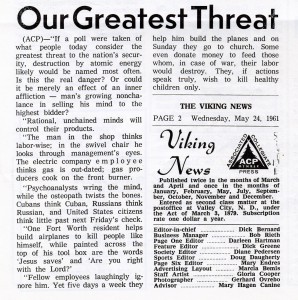
Valley City (ND) State Teachers College "Viking News" May 24, 1961
Sitting at the same table with me today was John Noltner, whose new and excellent book “
A peace of my mind: exploring the meaning of peace one story at a time” includes interviews and photos of 55 people.
I particularly noticed the pages (42-43) featuring former Minnesota Governor Al Quie (1979-83). Mr. Noltner added comments as follows: “
Al doesn’t believe that we can ever achieve world peace because of our competing political, economic, and belief systems. He believes the broke human condition will prevent us from achieving total peace. But Al believes in working towards inner peace and peace within communities….”
We may never reach the destination of the ideal of peace, but one person at a time we can help the process along.
Directly related post
here.
[Mar. 21, 2016: There was a followup blog post on this topic Dec. 20, 2011 [
here. See postnote at beginning of this post for more related links.]
UPDATE December 14, 2011
1. Please note additional comments added on-line (see the end of this post for access to these comments). As of this Dec 20 there are two comments, both from Bruce in Twin Cities.
Additional Comments
2.
From Jeff in Twin Cities: Voice of reason, not that it will gain you any friends amongst the hard core.
3.
From friend in England: Dear Mr Bernard,
50 years ago!? You are absolutely right, absolutely still relevant.
In that article as well as in the blog are the questions that exert minds and consciences for whom these capacities are still sufficiently active.
We obviously do not live in a perfect world, perhaps not even the best possible the way things are going! Does that mean compromise? Maybe not but it does mean answers must be nuanced & moderated. The need to prevent (inhuman) utopias! I increasingly believe that Camus got two important things right – and you allude to them in the blog.
The first is that Sisyphus will have to keep rolling that rock uphill as it slides down; but, he added, one has to imagine Sisyphus happy! Indeed all we can do is push for reasonableness & peace but without despair although as early as 2500 years ago, Heraclitus was dejected at the foolishness of men and urged them to think differently (laterally?): “donkeys prefer garbage to gold!”.
The other point Camus wrote about was that we should neither be executioners nor victims. I assume then a peaceful fight for peace & justice is the only alternative left. One thing that bothered you 50 years ago & still troubles you today is hypocrisy. Unfortunately in so many spheres of life it seems to be on the increase.
Kierkegaard titled one of his shorter works: “Purity of Heart is to Will one Thing” referring to James 1:8 “A double minded man [is] unstable in all his ways”. At times the instability that the double minded have inflicted upon the world becomes clear. May God grant us if not many pure of heart then at least many who are trying to be just that – and may he place them in positions of power: political, financial, & even military -till that last becomes irrelevant …
4.
From John N. in suburban Twin Cities:
I enjoyed your post and I agree with the notion that we are getting better at limiting our civilian casualties in war, when compared to decades and generations gone by. But I guess what concerns me most about the use of drones and remote warfare in general is how sanitized it can become.
I recognize the desire to preserve the lives of our soldiers. I remember though, even as a youth, when some others around me were fascinated with the technology of fighter jets and guided missiles…how I had trouble
embracing their enthusiasm, knowing what that technology was used for.
When we get so enamored with the technology of warfare, and when that warfare can be conducted from the safe and comfortable surroundings of a base, far removed from the battlefield, I believe there is the potential to lose touch with the actual damage that is being done. I worry that it becomes too easy to use those remote weapons when our own exposure is so limited in the process.
That being said, I do believe there are good uses for this technology, and used well, it can actually serve to make violent conflict less costly to civilians…but we must always remain aware of the power we are unleashing
and make certain that we understand fully the human cost of the technology we employ.
5.
From John B. in Twin Cities:
A Story: There was a farmer who had rat in his barn who alluded his capture. Finally, after days of trying, he lured the rodent into live trap. He removed the rat, dipped him in a can of gasoline and just before he threw the animal as far as he could, he set lighted match to the rodent. Seconds later the burning rat ran back into the barn causing the barn to go up in flames. (Moral of the story: The burning rat used the farmer’s anger against the farmer. Some clever folks will figure out a way to reprogram our drones, turn them against us.)
6. From Bob H:
December 15, 2011
Dear Dick, Frankly I was stunned and saddened to read your Blog #488 article defending the current U.S. use of drones on al Qaeda. But I appreciate your inviting a reaction.
Because you proudly proclaim association with the Catholic/Christian faith, I just have to ask, hellooo, what part of “Thou shalt not kill” do you not understand? While I do NOT proclaim any special theological claim in spite of my graduating with a minor in philosophy from a Catholic college, it would be hard to believe that Jesus would not support that commandment. One has to ask, “Whom would Jesus bomb?”
Drones indiscriminately kill civilians. They do not have eyes that see around corners or into buildings. The “Just war theory” has been dismissed by reputable theologians since we went from lances, maces, hot oil and saber killings! Even Pope John Paul II condemned George W.’s attack on Iraq and said, “this war would be a defeat for humanity could not be morally or legally justified” because of the indiscriminate and disproportionate inevitable killing of civilians by modern day weapons!
You state, “”drones are preferable.” When did you slip to the “Dark Side” in your take on killing? What is a “preferable” way to kill or assassinate?
And your referencing yourself as being a member of Veterans For Peace stuns me too, when you say, “though my cause is that of the Veterans for Peace.” Our “Statement of Purpose” states that we will work to “increase awareness of the costs of war, restrain government from intervening in the internal affairs of other nations,…” What part of the world and “other nations” do you see us using drones on?
I see no excuse for legitimizing drone use on sovereign nations where I assume you accepted our VFP “Statement of Purpose” for membership. And suggesting that it is OK to murder in certain circumstances seems to be a bit like saying it is OK to just kill a little.
You probably do not remember or did not read my article that appeared in our Veterans For Peace newsletter several years ago excoriating our country’s use of drones in far-flung sovereign nations. I wrote how the flip side of that, like foreign nations doing similar attacks on us on our country, would help us recognize the inevitable tragedy in their deployment.
The article below which is included in this quarter’s VFP newsletter also states my feelings about drone use, particularly in a country we are not at war with, Pakistan. I am sorry to see you have apparently been weaned from a conscience of “Thou shalt not kill’” into one that would give your stamp of approval of their “preferable” use to obliterate innocent children even though they man kill fewer people!
Your rationale sadly seems strikingly similar to the Germans in their rush to support Hitler in the 30’s. It is, as I have explained to you a long while ago, the shame of my German ancestral link which has for over 40 years prompted and sustained my work for true peace. I regularly remind myself of Edmund Burke’s “All that is necessary for the triumph of evil is for good men to remain silent.”
You are a good man. I just pray that you will join with MLK and those other non-violent supporters we admire in truly accepting the criminality of drone use and reconsider your position. They clearly do NOT, as you so properly write, promote your pledge “ to continue working towards a more peaceful world, through peaceful means.”
Peace, brother.
Here’s the article referred to earlier in Bob’s post:
Heberle VFP Drones001
7.
Grace, in St. Paul, on Dec. 18:
I so agree with “We desperately need to sit in other circles than just our own and truly engage with people of other points of view*.” Social science agrees with you too. Conformity is 32% even when the answer is obviously wrong, given that everyone else agrees on the wrong answer. However add just ONE courageous voice to that group and dynamics change drastically. Interestingly my experience is that one simple voice may even be more persuasive than a large minority if the person speaks well and shows respect. People who are not afraid are more open to listen.
* – Dick Bernard: I had made a followup invitation for comments from my own list, and in part had said as follows:
The peace and justice movement is at a critical fork in the road today; indeed seems to have taken one fork to the exclusion of the other. My belief is that continuing the old ways is in the long run an unproductive and indeed damaging strategy.
My campaign is for engagement with those of differing opinions, and openness to perhaps even modify or change opinions based on those conversations.
There is a place for idealism; but we live in a real world that isn’t going to go away. We need to truly engage with the entire community.
That is not a new campaign for me. 29 times in the first nearing three years of this [Outside the Walls] blog I have mentioned in one way or another the importance of “dialogue”, including in the very first blog post in March, 2009.
We desperately need to sit in other circles than just our own and truly engage with people of other points of view.
It is, it seems to me, the only possible viable choice to continuing to achieve incremental change – and we have achieved a great deal of positive change. There doesn’t seem to be much acceptance of that fact.
8.
from a friend who’s a Historian, Dec 17, responding to a note from me on this topic:
Your last lines [in my note to him] reflect my opinions completely.
What I said to the friend: Long and short, in my opinion, the peace and justice community could accomplish a great deal by engaging with the community around it, rather than simply protesting against, constantly, the assorted injustices it correctly identifies.
But it won’t….
9.
from Joe S, good friend and professor emeritus:
I was, quite frankly, shocked by your essay on drones, but have not had a chance before now to respond. Happily Bob H. did a better job than I would have in his communication of December 15. I agree with him completely as far as he went; but I would go a step further and state, with conviction, that our use of drone bombing is not only immoral, but also politically stupid. It will surely prove immensely counterproductive and is already doing so in Pakistan and elsewhere. Given the number of innocent people we annihilate — “collateral damage” to use the current euphemism — we are creating new terrorists (including many terrorists in waiting) faster than we can dispatch the old ones. And, short of creating committed terrorists, we are creating enemies (many of whom will willingly support terrorists) at an even faster rate. Sooner or later we will surely pay dearly for doing so. Put yourself in the position of a parent, who has just lost an innocent child to a drone attack and imagine your own response. What makes you think that to save American lives it is okay to snuff out the lives of others?
The biggest logical flaw in your whole argument is revealed in the following sentence: “Similarly, it would be nice if there were no need for drones, but given the alternative, killing a la the World Wars, ever more focused on civilians, I will take the lesser of the two evils.” By what reasoning do you believe that there were only two alternatives? Is not pursuing the path of peace also an alternative? Had even a small fraction of the 1.2 trillion dollars we’ve spent on the wars in Afghanistan and Iraq been allocated to building schools, clinics, and other productive facilities in developing countries, we’d now be way ahead of where we presently are in the eyes of the world. Similarly, if we devoted comparable sums to upgrading the quality of life in our own country, we would have become the model for the rest of the world that we (falsely) proclaim to be. And even isolationism, which I personally eschew, would, in my view, be a preferable alternative to the one you espouse.
Finally, your approach undermines the rule of law. It supports the doctrine that “might makes right.” Flawed though it is, the UN, not the US, should be assume the role of the global cop (and should be strengthened accordingly) and the International Criminal Court, aided by regional courts should become the chief dispensers of justice.
